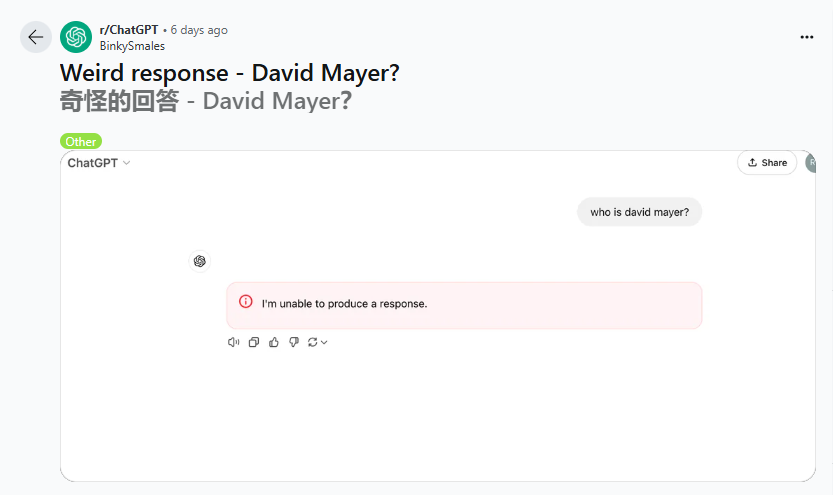Recently, a strange phenomenon of OpenAI's chatbot ChatGPT has sparked heated discussions on social media: when a user enters the name "David Mayer", ChatGPT will directly interrupt the conversation and reply "I cannot generate a response." This anomaly has caused widespread speculation and discussion, and OpenAI has yet to give an official explanation.
Recently, a confusing phenomenon appeared on social media: OpenAI's chatbot ChatGPT was unable to respond normally when the name "David Mayer" was mentioned, and directly interrupted the conversation.

This situation has triggered discussions and speculation among many netizens. Many people expressed confusion about this phenomenon and tried to ask ChatGPT for information about "David Mayer", but they all encountered the same ending.
When the user tried to ask "David Mayer," ChatGPT replied: "I can't generate a response." The chat session then ended unexpectedly, and the user had to reopen a window to continue using the assistant. This phenomenon has attracted widespread attention and discussion. However, OpenAI has not yet made any official response to this, and everyone is still full of questions about the cause of this situation.
It’s worth noting that David Mayer’s name is not common among public figures. Perhaps the most famous is David Meyer de Rothschild, a British explorer, environmentalist and heir to the Rothschild banking family. While the public figure has not had any run-ins with the AI chatbot, the specificity of his name has sparked much speculation.
Some netizens speculated that ChatGPT’s sensitive reaction to “David Mayer” may be related to certain legal issues. For example, the names of several individuals who have applied for the “right to be forgotten” under the European General Data Protection Regulation (GDPR) have triggered similar issues. In addition, someone mentioned a Chechen ISIS member who used "David Mayer" as an alias, which may also be one of the reasons that triggered the ChatGPT reaction.
Meanwhile, other names are also causing problems for ChatGPT, such as two law professors named Jonathan Zittrain and Jonathan Turley. It’s worth noting that Zittrain has written about “Controlling AI Agents” in The Atlantic. This series of phenomena is very surprising. Many users have also tried to change their names to "David Mayer", but ChatGPT still refuses to recognize this change.
While we're still awaiting an official explanation from OpenAI, this incident certainly highlights the operational complexity and black-box nature of large language models. This is also an important reminder for users: when using AI products, they should not easily trust the answers they give.
Highlights:
? ChatGPT fails to respond when "David Mayer" is mentioned and forces the conversation to end.
? "David Mayer" may be related to legal issues involving the GDPR right to be forgotten.
? Other names can also cause ChatGPT to malfunction, highlighting the complexity of the AI model.
The abnormal behavior of ChatGPT has raised concerns about the potential risks and transparency issues of large language models, and has once again emphasized the need for AI technology ethics and data security management. The subsequent development of this incident deserves continued attention.